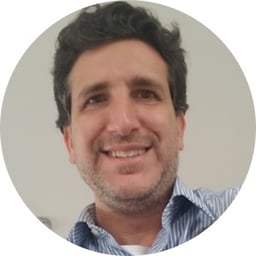Mauricio graduated with a degree in economics, and set out on a career with his own e-commerce site, after working in the banking and real estate markets. Unfortunately, soon thereafter, the economy of Brazil began to contract, making a site like Mauricio's unsustainable. Always eager to prepare for any business situation, Mauricio decided to add to his professional arsenal, going back to school to pursue his MBA with a focus in Big Data. While at school, he encountered R, a language he was unfamiliar with. Following the recommendation of a classmate, Mauricio signed up for DataCamp to learn R. Since then, he's grown very comfortable with R and with data visualization, even putting his knowledge to use to analyze WhatsApp data. He hopes to continue his data science education with DataCamp, learning more complex skills that will allow him to dig deeper into data, a skill he knows will pay professional dividends.
Tell us a little bit about yourself and your background with data science.
I graduated from Ibmec in 2003, and then went to work in banking, real estate and finally, my own e-commerce site. But Brazil was hit particularly hard by the worldwide financial crisis of the late 2000s, and I decided it would be smart to learn something new to ensure my career would continue. So, I went back to school at FGV, pursuing an MBA with a focus on Big Data. While at FGV, one of my classes made use of R, which I hadn't used before. A classmate told me about DataCamp, so I started the Intro to R course. I've been a member ever since.
What made you interested in data science? And did you have any experience with it before you started learning with DataCamp?
I didn't have any experience with R—I had some statistics experience because of my economics degree, and I knew some JavaScript, but R was new to me. In terms of why I'm interested in data science, when I had my e-commerce site, I really liked the analytics part of my job. We worked with SQL and Excel to dive deeper into the data, and I loved gaining real business intelligence from the data. It made me want to learn more about big data, and how I could use data to do my job better.
What do you like most about DataCamp?
I really like the step-by-step method of learning. The courses are really well structured and the learning is fun! I've recommended it to many of my classmates as a better way to learn R than the materials and textbooks we use in class.
I also really like that everything related to data science is covered. From vectors, to data frames, to creating your own visualizations—DataCamp has courses on everything. And it's all online, which makes it much more convenient to use. I've used online learning sites like Codecademy in the past, and found them really helpful. DataCamp is like Codeacademy, but for data science—that is great.
What DataCamp courses did you like the best?
I really liked the data visualization course on ggvis. The Kaggle course was great because it gave me a really good understanding of how a real-life project actually works. It helped me understand that making initial predictions isn't that hard, but that making the improvements that help your data analysis perform better is a lot more work. It was an important data science lesson to learn! Finally, my favorite course overall was the dplyr course—it had really easy-to-follow syntax and I learned a lot.
What advice would you give to students who are just starting on DataCamp?
I'd tell them to start with the Intro to R course, and then go on to the intermediate R course—that will bring them up to speed with R. Then I'd do Data Manipulation with dplyr (this is my favorite course!)—it's a really good opportunity to have your first experience with real data sets. And finally, I'd separate your statistics education from learning R. You can do so many things with both tools, and it would be a shame to lose out on learning either one.
What's next for you in data science?
I'm going to learn statistical concepts like means, random forests and logistic curves. I'm also focusing more on technologies like Hadoop and Spark—really, the more hardcore techniques. There is so much to learn, but I'm working hard to focus on the things that I can really put to use in my work.
Finally, you created something using the tools you learned with DataCamp. Can you tell us a little bit about it?
I created an online program that allows you to upload your WhatsApp conversations to R, and then it analyzes how many messages people send in a group, what days are the most busy and so on. It's really cool!
